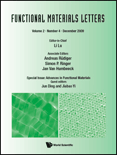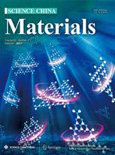
ADVANCED FUNCTIONAL MATERIALS
metrics 2024
Pioneering Innovations in Functional Materials
Introduction
ADVANCED FUNCTIONAL MATERIALS is a leading journal published by WILEY-V C H VERLAG GMBH, prominently recognized in the fields of biomaterials, chemistry, condensed matter physics, and materials science. With an impressive impact factor and a distinguished position in the Q1 quartile across multiple categories including nanoscience and nanotechnology, this journal serves as a vital platform for researchers and professionals committed to innovating in functional materials. Since its inception in 2000, ADVANCED FUNCTIONAL MATERIALS has published high-quality peer-reviewed articles that push the boundaries of materials science, exploring new frontiers in electronic, optical, and magnetic materials. The journal's dedication to open access ensures that its groundbreaking findings are readily available to a global audience, fostering collaboration and knowledge-sharing among scholars and practitioners in the field. For those seeking to stay at the forefront of materials research, ADVANCED FUNCTIONAL MATERIALS is an essential resource.
Metrics 2024
 5.50
5.50 18.50
18.50 19.60
19.60 402
402Metrics History
Rank 2024
Scopus
IF (Web Of Science)
JCI (Web Of Science)
Quartile History
Similar Journals

Materials Futures
Pioneering insights in biomaterials for a sustainable tomorrow.Materials Futures, an esteemed journal published by IOP Publishing Ltd, stands out as a pivotal resource in the field of Materials Science, with a particular emphasis on Biomaterials. Launched in 2022 and operating under an Open Access model, the journal aims to foster accessibility and rapid dissemination of pioneering research, thus catering to the diverse needs of researchers, professionals, and students globally. With a commendable Scopus Rank of #46 out of 137 in its category, placing it in the 66th percentile, and recognized as a Q1 journal as of 2023, Materials Futures provides a vital platform for cutting-edge studies and innovations that address contemporary challenges in materials science. As the journal evolves through its convergence period from 2022 to 2024, it continues to attract high-quality submissions aimed at advancing knowledge and applications within the biomaterials sector, reflecting its commitment to contributing vital insights and fostering collaboration across disciplines. Explore Materials Futures for your research endeavors and join a community dedicated to shaping the future of materials.

Functional Materials Letters
Pioneering discoveries for tomorrow's technologies.Functional Materials Letters, published by World Scientific Publishing Co. Pte Ltd, is an esteemed academic journal dedicated to disseminating cutting-edge research in the field of materials science. Since its inception in 2008, the journal has provided a vital platform for researchers, professionals, and students to share their discoveries pertaining to functional materials, which are integral for diverse applications ranging from electronics to advanced manufacturing. With an ISSN of 1793-6047 and an E-ISSN of 1793-7213, the journal operates out of Singapore and maintains a notable presence in the global academic community, currently ranked in the Q3 quartile for materials science. Although it does not offer open access, the journal ensures that its publications are rigorously peer-reviewed, contributing significantly to the advancement of knowledge in this rapidly evolving field. Researchers aiming to stay at the forefront of materials science will find Functional Materials Letters an indispensable resource that highlights innovative findings and fosters collaboration among scholars.

InfoMat
Empowering Scholars with Cutting-Edge Insights in Materials ChemistryInfoMat is a premier open-access journal published by WILEY that serves as a vital resource for scholars and practitioners in the fields of materials science, materials chemistry, and related disciplines. Since its inception in 2019, this journal has rapidly ascended in academic stature, currently holding a prestigious Q1 ranking across multiple categories, including Electronic, Optical and Magnetic Materials, Materials Chemistry, and Surfaces, Coatings and Films, showcasing its significant impact and relevance. With a commendable impact factor and a comprehensive scope, InfoMat provides a platform for high-quality research that drives innovation in the materials domain, appealing to researchers, professionals, and students alike. The journal’s open-access model enhances visibility and accessibility of cutting-edge studies, fostering a collaborative and informed scientific community. Based in the United Kingdom, InfoMat continues to shape the future of materials research through its commitment to excellence and accessibility.

Advanced Materials Interfaces
Advancing Knowledge at the Interfaces of InnovationAdvanced Materials Interfaces is a premier journal dedicated to the exploration and advancement of materials science, with particular emphasis on the interfacial phenomena that govern the behavior of materials in various engineering applications. Published by WILEY in the United Kingdom, this Open Access journal, established in 2014, has quickly ascended to a Q1 category ranking in both Mechanical Engineering and Mechanics of Materials as of 2023, reflecting its significant influence and excellence in the field. With impressive Scopus Ranks, such as #81 out of 672 in Mechanical Engineering and #58 out of 398 in Mechanics of Materials, it serves as a vital resource for researchers and practitioners aiming to push the boundaries of materials innovation. The journal provides unrestricted access to its cutting-edge research, promoting collaboration and dissemination of knowledge among the global scientific community, solidifying its role as a vital contributor to the ever-evolving landscape of materials engineering.

Science China-Materials
Exploring the Future of Materials Engineering.Science China-Materials is an esteemed peer-reviewed journal dedicated to advancing the field of materials science, published by SCIENCE PRESS. With a strong focus on innovative research and applications, this journal provides an essential platform for disseminating groundbreaking findings in materials development, characterization, and engineering. Since its inception, Science China-Materials has achieved an impressive Q1 ranking in the Materials Science (miscellaneous) category, reflecting its commitment to quality and the impact of its publications, as indicated by its 86th percentile ranking in Scopus. The journal is set to converge its contributions from 2016 to 2024, making it a vital resource for researchers and professionals interested in the latest advancements and trends in materials science. As an open access publication, it ensures that knowledge is freely available to a global audience, promoting collaboration and innovation across disciplines. The journal is headquartered in Beijing, China, and continues to attract high-quality submissions from leading experts in the field.

ACS Materials Au
Bridging Knowledge Gaps in Materials ChemistryACS Materials Au, published by the American Chemical Society, is a premier open-access journal that has been at the forefront of materials science since its inception in 2021. With an ISSN of 2694-2461, this journal encompasses an expansive range of topics including biomaterials, electronic, optical and magnetic materials, materials chemistry, and polymers and plastics, consistently achieving Q1 rankings in these categories for 2023. The journal is based in the United States and operates from the AMS's headquarters in Washington, DC, offering significant visibility and a robust platform for researchers. The journal's commitment to open access ensures wide dissemination of groundbreaking research, enabling a diverse audience—including researchers, professionals, and students—to engage with the latest advancements in materials science. With an encouraging impact factor and a focus on novel materials and innovative applications, ACS Materials Au stands as a vital resource for anyone devoted to understanding and advancing the frontiers of materials engineering and science.

BULLETIN OF MATERIALS SCIENCE
Connecting Researchers to the Pulse of Materials ScienceBulletin of Materials Science, published by the Indian Academy of Sciences, is a distinguished journal that has been contributing to the field of materials science since its inception in 1979. With an ISSN of 0250-4707 and E-ISSN 0973-7669, it provides a platform for researchers to share groundbreaking studies and advancements in the mechanics of materials and general materials science. As of 2023, the journal holds a respectable Q3 ranking in both the Materials Science (miscellaneous) and Mechanics of Materials categories, highlighting its competitive position in the academic landscape. Although the journal currently does not operate under an open access model, it remains a vital resource for professionals and students keen on exploring innovative material developments and methodologies. With a commitment to promoting high-quality research, the Bulletin of Materials Science features rigorous peer-review processes, making it an essential reference for anyone engaged in the materials science domain.

Advanced Science
Transforming Ideas into Scientific BreakthroughsAdvanced Science, published by Wiley, stands as a premier open-access journal since 2014, dedicated to fostering innovative research and insights across multiple disciplines including Biochemistry, Genetics and Molecular Biology, Chemical Engineering, Engineering, Materials Science, Medicine, and Physics and Astronomy. Based in Germany, this journal has quickly established itself in the academic community, receiving high recognition with a Q1 ranking in its respective categories as of 2023. With its impressive Scopus rankings, including #1 in Biochemistry, Genetics and Molecular Biology and #3 in General Engineering, Advanced Science plays a pivotal role in disseminating groundbreaking scientific knowledge to researchers, professionals, and students alike. By embracing an open access model, it ensures that high-quality research is readily available to a global audience, thus facilitating advancements in science and engineering fields.

Materials Today Advances
Connecting academia and industry through innovative research.Materials Today Advances is a premier open access journal, published by Elsevier, dedicated to disseminating cutting-edge research in the fields of Materials Science and Mechanical Engineering. Since its inception in 2019, the journal has quickly established itself within the academic community, achieving an impressive Q1 quartile ranking in both disciplines as of 2023, indicative of its high-impact contributions. Ranked #25 out of 672 in Mechanical Engineering and #46 out of 463 in General Materials Science according to Scopus, Materials Today Advances offers rigorous peer-reviewed articles that address the latest innovations and interdisciplinary approaches. Researchers, professionals, and students can benefit from the journal's open access model, ensuring widespread visibility and accessibility of groundbreaking findings. With the convergence of advanced materials research and practical applications, this journal represents a vital resource for those at the forefront of scientific discovery.

Journal of Ovonic Research
Connecting Researchers to Transform Material Science.Journal of Ovonic Research is a distinguished publication dedicated to advancing the fields of electronic, optical, and magnetic materials. Published by VIRTUAL CO PHYSICS SRL, this journal offers a platform for researchers to share innovative findings and developments that push the boundaries of technology and materials science. With an ISSN of 1842-2403 and an E-ISSN of 1584-9953, it provides an important service to the academic community, particularly within Romania and beyond. Despite its recent inception in 2011, the journal has gained traction in the academic landscape, reflecting a Q4 quartile ranking in crucial categories such as Electronic, Optical and Magnetic Materials, as well as in Physics and Astronomy. The Scopus rankings further underscore its positioning, ranking within the 25th to 37th percentile across various disciplines, making it a valuable resource for professionals and students alike. Although the journal currently operates on a non-open access basis, it remains committed to exploring the latest advancements in materials science, encouraging interdisciplinary collaboration and fostering a deeper understanding of surface, coating, and film technologies. As the field evolves, Journal of Ovonic Research stands as a beacon for scholarly communication, bridging the gap between research and practical application.